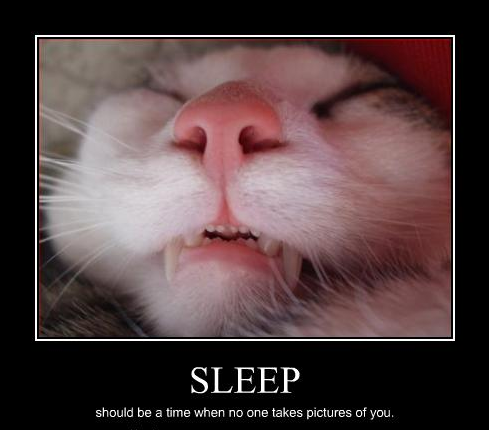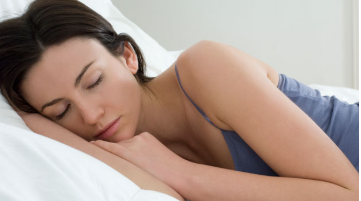The Importance Of Sleeping and Physique Transformation

Are you sleeping?
So you’ve finally decided its time for a change. Its time to shed all that unwanted body fat, become healthy and fit, and maybe build some muscle too. You’ve started working out more, changed the way you eat, and are extremely motivated… but there is still something missing. You get horrible sleep or your lifestyle is completely erratic. You sleep in until 11:00 am and don’t get to bed until 4:00 am. When you do try to go to bed early you end up just lying there staring at the clock, not able to fall asleep.
Sound Familiar?
A recent study showed that people who were sleep deprived (ONLY 4 hours sleep) ate approximately 560 calories MORE per day than those who got 8 hours. [1] This could lead to approximately 40 pounds gained in one year depending if energy expenditure remained the same.
Not only this but another recent study showed that you have a 41-65% GREATER odds of gaining 10 or more pounds over a 5-7 year time span if you have problems getting enough sleep. [2]
HOWEVER, Some of these studies are association studies and don’t prove exact causation. But sleep deprivation does have some effects on certain important hormones.
Sleep Deprivation Effects
Insulin and carbohydrate sensitivity of the fat and liver cells seem to be negatively affected by sleep deprivation if you get just half your normal amount of sleep for a week or less [3,4,5]. This is avoidable however once you get enough rest.
Sleep deprivation does seem to effect Cortisol (stress hormone) release by gradually decreasing the morning levels, increasing the evening levels, and increasing the overall cortisol release throughout the day (50% rise with 4 hour sleep).
Testosterone was also shown to be negatively affected by sleep deprivation by decreasing from 10-30% [6,7].
Orexin
Orexin is a hormone that INCREASES wakefulness and increases appetite. Because of the longer awake periods people tend to eat more as a side effect to the Orexin release but this also means an increased energy expenditure. [8]
Although as of now, it is unclear how sleep deprivation affects weight in humans but we do see caloric increases in people from 20-25% [9,10]
Performance
Getting adequate sleep long term seems to be an important part of getting that flat stomach or building that muscle bound frame not only because it effects certain hormones but also because it can effect physical performance.
ACUTE sleep deprivation in Endurance sports and sprint performance seems to be negatively affected [11,12] while acute sleep deprivation in weight lifting has not yet shown any adverse effect [13].
The real issue here is with CHRONIC sleep deprivation, anecdotally I think most would agree.
Metabolism
So far, it is very unclear whether or not sleep deprivation reduces metabolic rate but there are some studies showing a SMALL decrease [14] or NO decrease at all. [15,16]
The Sleep Cycle
Over the course of a night our body, or brain, goes through 5 stages of sleep. They’re divided into two phases which we cycle in and out of multiple times through out the night.
Phase 1 (includes stages 1-4):
1. Drowsiness (pre-sleep)
2. Light sleep
3. Deep sleep
4. Deeper sleep
*There is no dreaming, your heart rate slows down, you function at your Basal Metabolic Rate (BMR), and you release human growth hormone (hGH) and Luteinizing hormone from the pituitary gland.
Phase 2:
5. REM Sleep (Rapid-Eye-Movement)
*This is where dreaming occurs and adrenaline moves through the body. Heart rate, blood pressure, and body temperature all increase. Your muscles become limp, your fingers and face begin to twitch and your genitals become erect and/or moistened. REM Sleep is best for your mental well being.
People who train and sports athletes are prone to sleeping in stages 3 and 4 for longer periods of time because the extra stresses from training and workouts require greater recovery time and “Slow Wave Sleep” (SWS) apparently.

What Does Sleep Do?
Sleep is important. Period. It does a number of things and without it we would unavoidably end up with psychosomatic disorders and suffer from chronic fatigue and eventually commit suicide or something horrible like that… Not cool
- Learning and memory: Sleep helps the brain process and organize thoughts and memories.
- Disease: If we didn’t sleep, our immune functions would be horrible as this would affect the activity of the body’s killer cells. Sufficient sleep may also help fight cancers. On top of this, free radical production is increased and premature aging becomes more apparent.
- Cardiovascular health: Serious sleep disorders have been shown to increase hypertension, stress hormone levels, and irregular heartbeat.
- Mood: Without Sleep we could become VERY irritable, impatient, moody, and lose concentration easily. Too little sleep can also cause such low energy levels that you wouldn’t be able to do much physically.
- Safety: Falling asleep during daily activities could cause falls and mistakes such as air traffic mishaps, driving accidents, medical errors, etc…
*Insomnia has been shown to slow thyroid gland function which can ultimately affect metabolism and make losing fat more difficult as well.
One study showed evidence of DECREASED bone density and abnormal bone formation in rats when sleep was restricted. [17]
How Much Sleep Is Enough?
There is no “set in stone” rule when it comes to exactly how much sleep a person needs each night. An individual’s gender, age, stress levels, and physical work load or activity all come into play when finding the right amount of sleep. Over the course of history and looking at our evolutionary patterns it deems that the average human needs about 7-8.5 hours of sound sleep. [18]
This could be very different from one person to another. Some people may function on only 5 hours sleep while others need a full 9 or 10.
The best thing when discovering how much sleep you need is to go to bed at the same time every night and wake up the same time everyday. Track how you feel throughout the day and when you wake up. Don’t forget to take into account of physical work load and stress.

How Can You FIX Your Sleeping Patterns?
There are a number of ways you can “fix” your current sleeping patterns and I’m going to list a few here:
1. Circadian Rhythm: All humans have it built into their DNA. It is a 24 hour cycle that affects our biochemical, physiological, or behavioral processes. Different times of the day decide which bodily processes occur. This is why going to bed BEFORE 12:00pm and optimally before or between 10:00 pm and 11:00 pm can help improve a proper sleep cycle to occur and for recovery to happen efficiently. LIGHT therapy has been shown to “re-train” this rhythm through the release of serotonin. [19,20]
2. Schedule Yourself: This is the hardest part for people to realize. They sleep in or live erratically and wonder why they can’t go to bed early or why they lay there at 2:00 am in the morning not being able to fall asleep. Go to bed and wake up the same time every day
“You can’t control when you fall asleep, but you can control when you wake up”
By setting an alarm for say 6:00 am or 8:00 am you can “reset” your biological clock, sort of like re-programming your brain. YES you will hate it and YES you will feel like throwing your alarm clock across the room BUT if you do this for the next 3 weeks I promise you, you will see improvement. Consistency is key.
3. Train Intensely: Short intense resistance training and physical activity has been shown to increase Slow Wave Sleep (vital for mental and physical recovery) and inhibit Paradoxical Sleep. The same applies to the Central Nervous System (CNS). Stimulating the Sympathetic Nervous system through training can help to balance and promote the Parasympathetic Nervous System which will help in relaxation, recovery, and sleep.
4. What You Eat: Believe it or not eating carbs can indirectly help relax you and this can help you fall assleep through serotonin synthesis. So if you’re eating in a caloric deficit then having some carbs before bed in a meal can really help and not effect fat loss.
You don’t have to go to bed hungry so eat a small portion of high quality protein, leafy green vegetables, essential fatty acids and starchier carbohydrates.
5. Take a Nap: Some times its just not possible to get in a full 8 hours of sleep every night. Taking a nap around 3-4pm or lying in the horizontal position for 20-30 minutes can be anabolic. Set a timer, anything more than 60 minutes may affect falling asleep and leave you groggy for the rest of the day.

6. Learn to RELAX: Avoid stimulants like caffeine from coffee or Tea before bed. Alcohol, tobacco, and nicotine should be reduced or eliminated. Reduce stresses that life brings through meditation, exercise, walks, nutrition, and other relaxation techniques/therapies. Intense exercise right before bed may be too stimulating so dim the lights as you approach bed time, read a book, take a warm calming bath, stretch, or get a massage. In serious cases the use of medicinal marijuana has been shown to be highly effective and safe.
7. Control Where You Sleep: Your bed should be for sleeping only (next to other activities not mentioned here). So avoid working or doing other activities where you sleep. Sleep in total darkness, block out all sounds (ear plugs are optional), and make sure your bed is comfortable.
8. Avoid Prescription Drugs and Consume Natural Health Products: Prescription drugs can be addicting, affect your bodies own natural processes, and include multiple side effects. Try the following supplements to improve sleep and help calm the body:
1. Tryptophan (amino acid)
2. 5-HTP (5-hydroxytryptophan)
3. Melatonin (hormone)
4. Valerian
5. St. John’s Wort
6. Passionflower
7. Calcium
8. Magnesium
9. Niacin
10. Inositol
11. Chromium
12. Lavender
Other Homeopathic Remedies: Chinese herbs, Bach flower therapies, chamomile, kava kava.
Conclusion
Everyone knows through anecdotal evidence that sleep is important and can probably effect ones energy and performance. Although there is not definitive research on sleep deprivation and obesity/weight gain there are studies showing close associations and clinical evidence that it probably doesn’t help fat loss, overall health, and muscle goals.
Acute responses to poor sleep seem to effect hormones that support muscle and fat loss but getting enough sleep can greatly reverse these effects.
Not getting adequate sleep might cause you to eat more and train less intensely. But also keep in mind the longer you’re up and moving the more calories you may burn overall.
Establishing a routine and taking some supplements may help (melatonin etc.) BUT avoiding stimulants and unnatural lighting cycles might make the difference.
If you found this post helpful or interesting please comment below or click one of the share buttons to show someone you think it may help :)
References
1. Nedeltcheva, A.V., et al. Insufficient sleep undermines dietary efforts to reduce adiposity. Ann Intern Med. 153:435-441, 2010.
2. Lyytikäinen, P., et al. Sleep problems and major weight gain: a follow-up study. Int J Obes. 35:109-114, 2011.
3. Broussard JL, et al. Impaired insulin signaling in human adipocytes after experimental sleep restriction: a randomized, crossover study. Ann Intern Med. (2012)
4. Donga E, et al. A single night of partial sleep deprivation induces insulin resistance in multiple metabolic pathways in healthy subjects. J Clin Endocrinol Metab. (2010)
5. Buxton OM, et al. Sleep restriction for 1 week reduces insulin sensitivity in healthy men. Diabetes. (2010)
6. Leproult R, Van Cauter E. Effect of 1 week of sleep restriction on testosterone levels in young healthy men. JAMA. (2011)
7. Cortes-Gallegos V, et al. Sleep deprivation reduces circulating androgens in healthy men. Arch Androl. (1983)
8. Martins PJ, et al. Orexin activation precedes increased NPY expression, hyperphagia, and metabolic changes in response to sleep deprivation. Am J Physiol Endocrinol Metab. (2010)
9. Bosy-Westphal A, et al. Influence of partial sleep deprivation on energy balance and insulin sensitivity in healthy women. Obes Facts. (2008)
10. Nedeltcheva AV, et al. Sleep curtailment is accompanied by increased intake of calories from snacks. Am J Clin Nutr. (2009)
11. Skein M, et al. Intermittent-sprint performance and muscle glycogen after 30 h of sleep deprivation. Med Sci Sports Exerc. (2011)
12. Oliver SJ, et al. One night of sleep deprivation decreases treadmill endurance performance. Eur J Appl Physiol. (2009)
13. Blumert PA, et al. The acute effects of twenty-four hours of sleep loss on the performance of national-caliber male collegiate weightlifters. J Strength Cond Res. (2007)
14. Nedeltcheva AV, et al. Insufficient sleep undermines dietary efforts to reduce adiposity. Ann Intern Med. (2010)
15. Opstad PK, et al. The thyroid function in young men during prolonged exercise and the effect of energy and sleep deprivation. Clin Endocrinol (Oxf). (1984)
16. Klingenberg L, et al. Sleep restriction is not associated with a positive energy balance in adolescent boys. Am J Clin Nutr. (2012)
17. Chronically inadequate sleep results in abnormal bone formation and abnormal bone marrow in rats September 2012 vol. 237 no. 91101-1109
18. Brondel, L., et al. Acute partial sleep deprivation increases food intake in healthy men. American Journal of Clinical Nutrition (published ahead of print; available online March 31,2010)
19. Paul MA, et al. Phase advance with separate and combined melatonin and light treatment. Psychopharmacology (Berl). (2011)
20. Boulos Z, et al. Light visor treatment for jet lag after westward travel across six time zones. Aviat Space Environ Med. (2002)
Other References:
– Dr. Cory Holly Institute: The Certified Sports Nutrition Education Program Module 3
– Dr. Cory Holly Institute: The Certified Sports Nutrition Education Program Module 5
– www.WebMD.com
– Harvard Health Publications: Importance of Sleep; 2006
– “Pediatric Neuroendocrinology”; Role of Sleep and Sleep Loss in Hormonal Release and Metabolism; R. Leproult, et al.; 2010
– University of Chicago Medical Center: Sleep Loss Boosts Appetite, May Encourage Weight Gain; 2004
– Lyytikäinen P, Lallukka T, Lahelma E, Rahkonen O. Int J Obes (Lond). 2011 Jan;35(1):109-14. doi: 10.1038/ijo.2010.113. Epub 2010 Jun 8.
– Benedict, C., et al. Acute sleep deprivation reduces energy expenditure in healthy men. Am J Clin Nutr. Apr 6, 2011 (Epub ahead of print)
– Chaput, J.P., and A. Tremblay. Sleeping habits predict the magnitude of fat loss in adults exposed to moderate caloric restriction. Obes Facts. 5(4):561-566, 2012.


1 Comment
Join the discussion and tell us your opinion.
Very, very nice page! :)